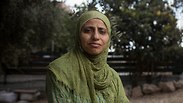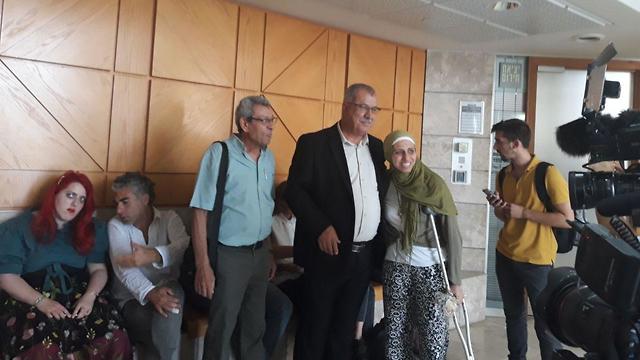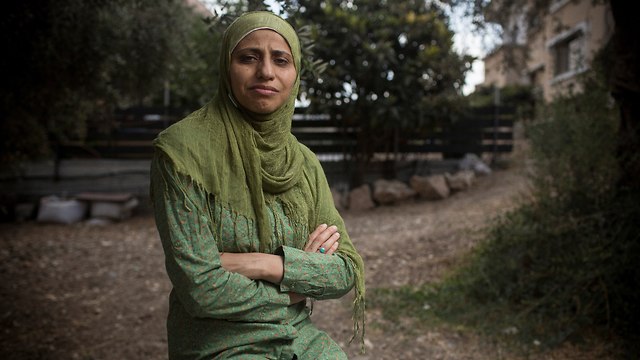

Israeli court convicts Arab poet of incitement
Dareen Tatour posted video of herself reading a poem she wrote accompanying footage of Palestinian rioters hurling stones and Molotov cocktails; verses include 'Follow the caravan of shahid (martyrs)... resist the settlers robbery'; Tatour insists her words were misunderstood.
The Nazareth Magistrate's Court convicted an Arab poet on Thursday of online incitement to terrorism after she used a poem as the soundtrack to images of Palestinians in violent confrontations with Israeli troops.
Dareen Tatour, 36, posted to Facebook and YouTube a video of herself reading out her poem "Resist, My People, Resist," accompanying footage of masked Palestinian youths throwing stones and firebombs at IDF soldiers.
It was published in October 2015 during a wave of deadly Palestinian terror attacks on Israelis. The Israeli-Arab poet was arrested a few days later, and prosecutors said her post was a call for violence.
Tatour, who denied the charges, said her poem was misunderstood by the Israeli authorities. It read: "Resist, my people, resist them / Resist the settlers robbery / And follow the caravan of martyrs."
She said there was no call for violence in the poem, rather for a struggle, which Israeli authorities had cast as violent.
The judge delivered a 52-page verdict that went into a detailed literary analysis of the text and video, and of the Arabic word "shahid"—which means "martyr" in English.
Language experts called by the defense as witnesses included a famous Israeli poetry professor and an expert in Arabic-Hebrew translation.
The translator told the court that "shahid" meant different things to people on different sides of the Israeli-Palestinian conflict.
"The Israeli hears 'shahid' and sees an aggressor. The Palestinian sees a victim. That's a big difference. One sees an attacker blowing up a bus, the other sees a child shot by soldiers," the expert, Yonatan Mendel, told the court in March 2017.
The judge, however, noted in her ruling that the poem was presented with a backdrop of violent rioting rather than "a backdrop typical to the reality of the occupation," as the defendant claimed.
According to the judge "the aforementioned violent video does not include images of casualties and victims or legal protests. The video reflects only violent resistance/uprising throughout."
Online surveillance
Tatour's case became a cause célèbre for freedom of speech advocates in Israel. It drew attention to the advanced technology used by Israeli security agencies to trawl through social media to identify and arrest users suspected of incitement to violence or of planning attacks.
In her ruling, the judge came down against the defense’s interpretation of Tatour's words, pointing to a separate post in which Tatour had used "shahid" to describe a Palestinian assailant who had stabbed a 15-year-old Israeli.
"The combination leaves no interpretation of the word 'martyr' other than a violent interpretation that incites to terrorism, and to follow martyr-attackers," the verdict said.
"The freedom of expression is not absolute," the judge went on to write. "In a case such as this—in which it is clear there is a call for an act of terrorism posted among thousands of members of the defendants' Facebook group and among an unlimited audience on YouTube, along with a video that bolsters the call for violence that comes from the text—the poem cannot receive the protection of the court merely because the words of incitement were written as a poem."
Tatour was also charged with supporting a terrorist group. Prosecutors said she had expressed support for the Palestinian terror group Islamic Jihad's call for an uprising.
In addition, after a woman from Nazareth tried to stab a soldier and was shot at the Afula Central Bus Station in October 2015, Tatour posted the terrorist's photo on her Facebook and wrote "I'm the next shahid."
Tatour, who belongs to Israel's Arab minority, comes from a village near Nazareth in northern Israel. She is expected to appeal the verdict, her lawyer said.
"I am ready for everything and do not regret anything I have done. I have done nothing wrong," Tatour said at the Nazareth Magistrate's court.
Indictments for online incitement have tripled in Israel since 2014. Prosecutions by the IDF have also increased in the West Bank—most of those charged are young Palestinians.
The average sentence in incitement cases is nine months, though the maximum term that Tatour could face is five years. The court has not issued a date for her sentencing.


















